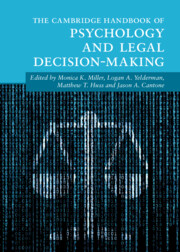Book contents
- The Cambridge Handbook of Psychology and Legal Decision-Making
- Cambridge Handbooks in Psychology
- The Cambridge Handbook of Psychology and Legal Decision-Making
- Copyright page
- Dedication
- Contents
- Figures
- Tables
- Editors
- Contributors
- Part I Introduction Chapters
- Part II Pretrial Phase Decision-Making
- Part III Trial Phase Decision-Making
- Part IV Postconviction Phase Decisions
- Part V Other Legal Decision-Making
- Part VI Perspectives from the Field
- Part VII Conclusion
- 51 Conclusions from the Field of Legal Decision-Making
- Index
51 - Conclusions from the Field of Legal Decision-Making
from Part VII - Conclusion
Published online by Cambridge University Press: 22 February 2024
- The Cambridge Handbook of Psychology and Legal Decision-Making
- Cambridge Handbooks in Psychology
- The Cambridge Handbook of Psychology and Legal Decision-Making
- Copyright page
- Dedication
- Contents
- Figures
- Tables
- Editors
- Contributors
- Part I Introduction Chapters
- Part II Pretrial Phase Decision-Making
- Part III Trial Phase Decision-Making
- Part IV Postconviction Phase Decisions
- Part V Other Legal Decision-Making
- Part VI Perspectives from the Field
- Part VII Conclusion
- 51 Conclusions from the Field of Legal Decision-Making
- Index
Summary
As should be clear from the preceding 50 chapters in this book, the type and number of decisions made in the legal system are virtually endless. In the criminal context, the offenders decide to commit, the victims decide whether to report, and bystanders decide whether to report or cooperate. The police decide if and how they will interrogate. Suspects decide whether to cooperate with police and whether to accept a plea bargain. Attorneys decide whether to prosecute and encourage their clients to settle or negotiate a plea bargain. Psychologists decide if a defendant is competent, insane, and/or amenable to treatment. Jurors decide a verdict (and occasionally, as in death penalty trials, a sentence), and judges decide whether to admit evidence and what sentence a defendant should receive. In the civil context, people harmed decide whether to sue, and attorneys decide whether to take the case and what evidence to rely on. Judges make decisions throughout the civil litigation process, and both jurors and judges can make ultimate decisions (e.g., verdict, damages). Other decisions include legislators’ decisions on defining crime, social workers’ decisions on whether to take action against a parent who is under their supervision, parole board members’ decisions on whether a person in prison should be released, and so on.
- Type
- Chapter
- Information
- The Cambridge Handbook of Psychology and Legal Decision-Making , pp. 715 - 724Publisher: Cambridge University PressPrint publication year: 2024



